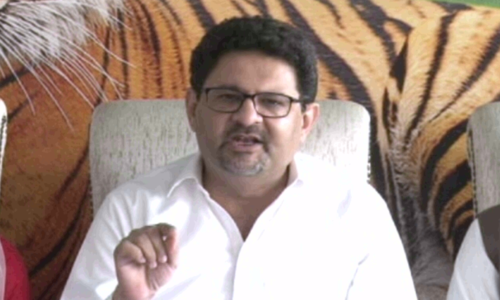KARACHI: “Our industrial policy is not correct. Whenever we have high growth, it is never translated into lasting industrialisation and agriculture efficiency because we consume our profits instead of investing them.”
This was pointed out by industrialist and former finance minister of Pakistan Dr Miftah Ismail while discussing how to achieve sustainable economic growth in Pakistan during his online talk organised by the English Speaking Union of Pakistan here on Thursday.
“About half of Pakistan’s workforce is employed in agriculture and yet they only produce about 21 per cent of our gross domestic product. Our farmers are not competitive. Ours is a very labour-intensive farming and our farm output, be it of wheat, cotton, even rice, milk, etc, is less than our comparative countries such as India, Bangladesh, China, etc.
“India produces about 30 or 40 per cent more cotton per hectare; China produces more cotton per hectare and same with wheat and a lot of other agricultural commodities. Even our best Sahiwal buffaloes give about seven to eight litres of milk per day whereas these Australian and Swedish cows give about 25 to 30 litres of milk per day.
“Whereas all the countries have been able to improve their farm outputs, our farm outputs lack. It’s as simple as that. We are not competitive. The price of Indian commodities will always be lower. And we will have to put boundaries on the borders or subsidise our farmer directly but he will get poorer as the years go by when compared to the farmers of other countries,” he added.
“We may have the potential, but we don’t have efficiency in our agriculture sector,” he added.
“During Pervez Musharraf’s time, our currency was at Rs60 per dollar for a long time. Then, the currency devalued to Rs80 and during 2007 and 2008, as the price of oil and other commodities went up, the government at the time let the budget deficit balloon.
“And when the PPP came, the price of fuel was very high, but Shaukat Tareen at that time tried to manage a reasonable soft landing instead of trashing the economy as such. But, nonetheless, the growth rates went down and inflation was very high, so he had to raise the price of petrol to plug the budget deficit and in a couple of years was able to bring the budget deficit down.
“Then when the Nawaz government came to power in 2013, the budget deficit was also very high.
“The PPP left us with an 8.2 per cent budget deficit.
“However, in five years we doubled the taxes and again in the fifth year the economy heated up, the imports were going up drastically and again our exports had no elasticity. They were not going up,” he said.
“Then when the PTI came, Asad Umar did not make a soft landing like Tareen had and there was a sudden devaluation of currency,” he pointed out.
“In Pakistan, you have industries that are 30, 40, 50 years behind in production and you still give them barriers, so industrial policy in Pakistan sometimes leads to very perverse results,” he said.
Published in Dawn, August 6th, 2021














































